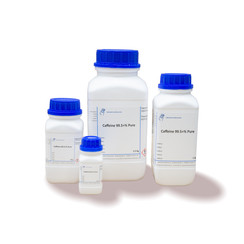You have no items in your shopping cart
Caffeine
Caffeine is a central nervous system (CNS) stimulant of the methylxanthine class. It is the world's most widely consumed psychoactive drug. Unlike many other psychoactive substances, it is legal and unregulated in nearly all parts of the world. There are several known mechanisms of action to explain the effects of caffeine. The most prominent is that it reversibly blocks the action of adenosine on its receptors and consequently prevents the onset of drowsiness induced by adenosine. Caffeine also stimulates certain portions of the autonomic nervous system.
Caffeine is a bitter, white crystalline purine, a methylxanthine alkaloid, and is chemically related to the adenine and guanine bases of deoxyribonucleic acid (DNA) and ribonucleic acid (RNA). It is found in the seeds, nuts, or leaves of a number of plants native to Africa, East Asia and South America, and helps to protect them against predator insects and to prevent germination of nearby seeds. The most well-known source of caffeine is the coffee bean - technically the seed of the Coffea plant. People may drink beverages containing caffeine to relieve or prevent drowsiness and to improve cognitive performance. To make these drinks, caffeine is extracted by steeping the plant product in water, a process called infusion. Caffeine-containing drinks, such as coffee, tea, and cola, are very popular; as of 2014, 85% of American adults consumed some form of caffeine daily, consuming 164 mg on average.
Caffeine can have both positive and negative health effects. It can treat and prevent the premature infant breathing disorders bronchopulmonary dysplasia of prematurity and apnea of prematurity. Caffeine citrate is on the WHO Model List of Essential Medicines. It may confer a modest protective effect against some diseases, including Parkinson's disease. Some people experience sleep disruption or anxiety if they consume caffeine, but others show little disturbance. Evidence of a risk during pregnancy is equivocal; some authorities recommend that pregnant women limit caffeine to the equivalent of two cups of coffee per day or less. Caffeine can produce a mild form of drug dependence – associated with withdrawal symptoms such as sleepiness, headache, and irritability – when an individual stops using caffeine after repeated daily intake. Tolerance to the autonomic effects of increased blood pressure and heart rate, and increased urine output, develops with chronic use (i.e., these symptoms become less pronounced or do not occur following consistent use).
Caffeine is classified by the US Food and Drug Administration as generally recognized as safe (GRAS). Toxic doses, over 10 grams per day for an adult, are much higher than the typical dose of under 500 milligrams per day. A cup of coffee contains 80–175 mg of caffeine, depending on what "bean" (seed) is used and how it is prepared (e.g., drip, percolation, or espresso). Thus it requires roughly 50–100 ordinary cups of coffee to reach the toxic dose. However, pure powdered caffeine, which is available as a dietary supplement, can be lethal in tablespoon-sized amounts.


